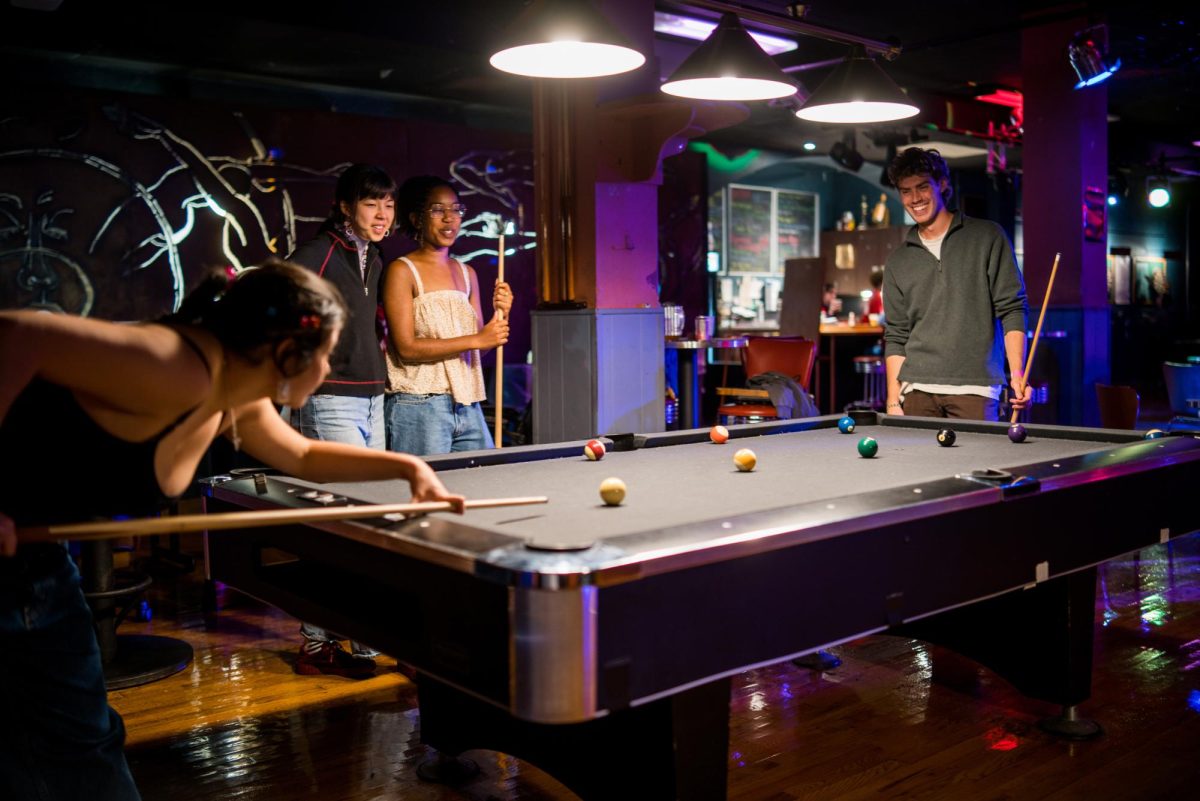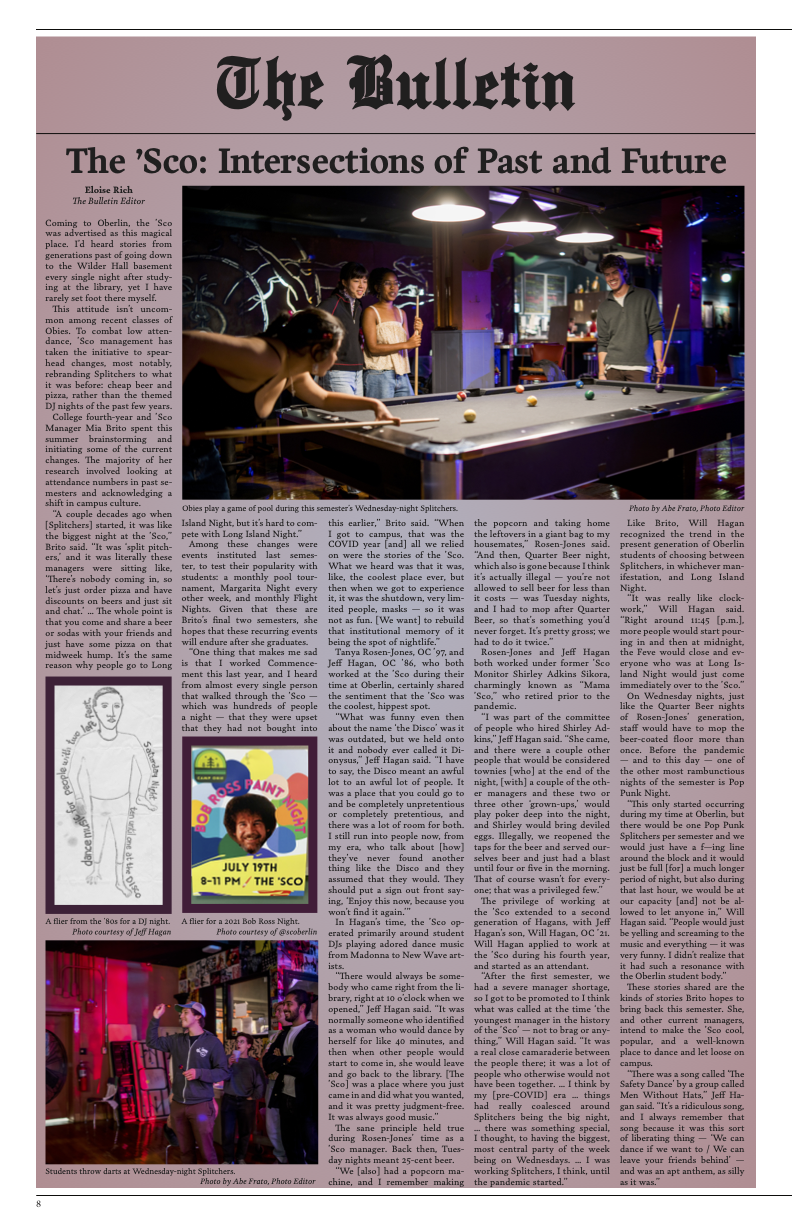Coming to Oberlin, the ’Sco was advertised as this magical place. I’d heard stories from generations past of going down to the Wilder Hall basement every single night after studying at the library, yet I have rarely set foot there myself.
This attitude isn’t uncommon among recent classes of Obies. To combat low attendance, ’Sco management has taken the initiative to spearhead changes, most notably, rebranding Splitchers to what it was before: cheap beer and pizza, rather than the themed DJ nights of the past few years.
College fourth-year and ’Sco Manager Mia Brito spent this summer brainstorming and initiating some of the current changes. The majority of her research involved looking at attendance numbers in past semesters and acknowledging a shift in campus culture.
“A couple decades ago when [Splitchers] started, it was like the biggest night at the ’Sco,” Brito said. “It was ‘split pitchers,’ and it was literally these managers were sitting like, ‘There’s nobody coming in, so let’s just order pizza and have discounts on beers and just sit and chat.’ … The whole point is that you come and share a beer or sodas with your friends and just have some pizza on that midweek hump. It’s the same reason why people go to Long Island Night, but it’s hard to compete with Long Island Night.”
Among these changes were events instituted last semester, to test their popularity with students: a monthly pool tournament, Margarita Night every other week, and monthly Flight Nights. Given that these are Brito’s final two semesters, she hopes that these recurring events will endure after she graduates.
“One thing that makes me sad is that I worked Commencement this last year, and I heard from almost every single person that walked through the ’Sco — which was hundreds of people a night — that they were upset that they had not bought into this earlier,” Brito said. “When I got to campus, that was the COVID year [and] all we relied on were the stories of the ’Sco. What we heard was that it was, like, the coolest place ever, but then when we got to experience it, it was the shutdown, very limited people, masks — so it was not as fun. [We want] to rebuild that institutional memory of it being the spot of nightlife.”
Tanya Rosen-Jones, OC ’97, and Jeff Hagan, OC ’86, who both worked at the ’Sco during their time at Oberlin, certainly shared the sentiment that the ’Sco was the coolest, hippest spot.
“What was funny even then about the name ‘the Disco’ was it was outdated, but we held onto it and nobody ever called it Dionysus,” Jeff Hagan said. “I have to say, the Disco meant an awful lot to an awful lot of people. It was a place that you could go to and be completely unpretentious or completely pretentious, and there was a lot of room for both. I still run into people now, from my era, who talk about [how] they’ve never found another thing like the Disco and they assumed that they would. They should put a sign out front say- ing, ‘Enjoy this now, because you won’t find it again.’”
In Hagan’s time, the ’Sco operated primarily around student DJs playing adored dance music from Madonna to New Wave artists.
“There would always be somebody who came right from the library, right at 10 o’clock when we opened,” Jeff Hagan said. “It was normally someone who identified as a woman who would dance by herself for like 40 minutes, and then when other people would start to come in, she would leave and go back to the library. [The ’Sco] was a place where you just came in and did what you wanted, and it was pretty judgment-free. It was always good music.”
The sane principle held true during Rosen-Jones’ time as a ’Sco manager. Back then, Tuesday nights meant 25-cent beer.
“We [also] had a popcorn machine, and I remember making the popcorn and taking home the leftovers in a giant bag to my housemates,” Rosen-Jones said. “And then, Quarter Beer night, which also is gone because I think it’s actually illegal — you’re not allowed to sell beer for less than it costs — was Tuesday nights, and I had to mop after Quarter Beer, so that’s something you’d never forget. It’s pretty gross; we had to do it twice.”
Rosen-Jones and Jeff Hagan both worked under former ’Sco Monitor Shirley Adkins Sikora, charmingly known as “Mama ’Sco,” who retired prior to the pandemic.
“I was part of the committee of people who hired Shirley Adkins,” Jeff Hagan said. “She came, and there were a couple other people that would be considered townies [who] at the end of the night, [with] a couple of the other managers and these two or three other ‘grown-ups,’ would play poker deep into the night, and Shirley would bring deviled eggs. Illegally, we reopened the taps for the beer and served our- selves beer and just had a blast until four or five in the morning. That of course wasn’t for every- one; that was a privileged few.”
The privilege of working at the ’Sco extended to a second generation of Hagans, with Jeff Hagan’s son, Will Hagan, OC ’21. Will Hagan applied to work at the ’Sco during his fourth year, and started as an attendant.
“After the first semester, we had a severe manager shortage, so I got to be promoted to I think what was called at the time ‘the youngest manager in the history of the ’Sco’ — not to brag or anything,” Will Hagan said. “It was a real close camaraderie between the people there; it was a lot of people who otherwise would not have been together. … I think by my [pre-COVID] era … things had really coalesced around Splitchers being the big night, … there was something special, I thought, to having the biggest, most central party of the week being on Wednesdays. … I was working Splitchers, I think, until the pandemic started.”
Like Brito, Will Hagan recognized the trend in the present generation of Oberlin students of choosing between Splitchers, in whichever manifestation, and Long Island Night.
“It was really like clockwork,” Will Hagan said. “Right around 11:45 [p.m.], more people would start pouring in and then at midnight, the Feve would close and everyone who was at Long Island Night would just come immediately over to the ’Sco.”
On Wednesday nights, just like the Quarter Beer nights of Rosen-Jones’ generation, staff would have to mop the beer-coated floor more than once. Before the pandemic —and to this day—one of the other most rambunctious nights of the semester is Pop Punk Night.
“This only started occurring during my time at Oberlin, but there would be one Pop Punk Splitchers per semester and we would just have a f—ing line around the block and it would just be full [for] a much longer period of night, but also during that last hour, we would be at our capacity [and] not be allowed to let anyone in,” Will Hagan said. “People would just be yelling and screaming to the music and everything — it was very funny. I didn’t realize that it had such a resonance with the Oberlin student body.”
These stories shared are the kinds of stories Brito hopes to bring back this semester. She, and other current managers, intend to make the ’Sco cool, popular, and a well-known place to dance and let loose on campus.
“There was a song called ‘The Safety Dance’ by a group called Men Without Hats,” Jeff Hagan said. “It’s a ridiculous song, and I always remember that song because it was this sort of liberating thing — ‘We can dance if we want to / We can leave your friends behind’ — and was an apt anthem, as silly as it was.”



